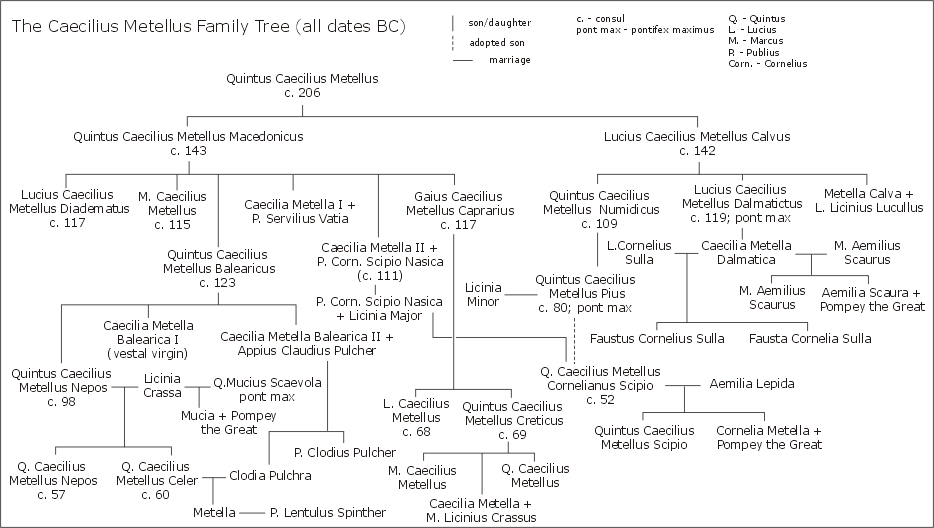Sextus Roscius
Sextus Roscius (often referred to as Sextus Roscius the Younger to differentiate him from his father) was a Roman citizen farmer during the latter days of the Roman Republic. In 80 BC, he was tried in Rome for patricide and was successfully defended by the 27-year old Cicero in the extant Pro Roscio Amerino, his first major litigation. The case involved some risk for Cicero, since he accused Lucius Cornelius Chrysogonus, a freedman of Sulla, dictator of Rome the previous year of the trial, of corruption and involvement in the crime.
Sheltered by Caecilia

Before the trial, Roscius was sheltered by Caecilia,[1] probably Caecilia Metella Balearica, a former Vestal Virgin by this time (since she had her own house). Caecilia was a relative of Sulla's wife Caecilia Metella Dalmatica, and had powerful connections among the Roman elite; her intercession for the young Julius Caesar saved his life and political career. In 80 BC, the Metelli family were staunchly in Sulla's court. Her brother was Quintus Caecilius Metellus Nepos, a former consul whose stepdaughter, Mucia Tertia, was wife of Pompey. Her cousins included Quintus Caecilius Metellus Numidicus Pius, chief ally of Sulla. Her widowed brother-in-law was Appius Claudius Pulcher, another Sulla ally, who had been Praetor in 88 BC.
Trial
| Wikisource has original text related to this article: |
Sextus Roscius was accused of patricide, killing his own father, Sextus Roscius senior, who was murdered in the streets of Rome after a dinner.
Sextus Roscius, like Cicero a native of the Roman countryside, was from Ameria. Though not in Rome at the time of the murder, Sextus was accused of killing his father, also named Sextus Roscius. Because the senior Sextus was in proscription list, his properties were taken by the government and sold at an auction after his son was accused of his murder. Erucius, the prosecutor, argued that the accused must have hired someone else "to do the deed for him", without naming other possible suspects.[2] Two relatives of the deceased and councilmen in Ameria, T. Roscius Capito, and T. Roscius Magnus, were brought in to testify. In his first major litigation, Cicero turned the trial around by accusing Capito and Magnus of murdering the father for political gain.[3] However, the argument for the defense would likely be considered doubtful by today's standards.
Cicero argued that those who chose to align themselves with Chrysogonus in the belief that they were supporting the nobility were wrong to do so, since his corruption was a stain on the Republic. "For the cause will be rendered more splendid by resisting every worthless man. The worthless favourers of Chrysogonus, who think that his cause and theirs are identical, are injured themselves by separating themselves from such splendor." [4]
Eventually, Sextus the younger was acquitted of the murder charges but never repossessed his land.
In popular culture
- The trial of Sextus Roscius is depicted in Steven Saylor's first Roma Sub Rosa mystery novel, Roman Blood.
- Colleen McCullough's novel Fortune's Favorites, part of her Masters of Rome series, also dramatizes the trial.
- The trial is dramatized in the BBC documentary series Timewatch in the episode "Murder in Rome" featuring Mark McGann as Sextus Roscius.
- Big Finish Productions adapted the trial of Sextus Roscius in Cicero by David Llewellyn. Sextus Roscius is portrayed by Simon Ludders.[5]
References
- ↑ Oration for Sextus Roscius of Ameria Archived 2008-03-02 at the Wayback Machine. "Caecilia, the sister of Nepos, the daughter of Balearicus"
- ↑ https://www.uvm.edu/~bsaylor/latin/RosciusCommIntro.pdf
- ↑ Boatwright, Mary T.; Gargola, Daniel J.; Talbert, Richard J. A. (2004-02-26). The Romans: From Village to Empire. Oxford University Press, USA. ISBN 9780195118759.
- ↑ "M. Tullius Cicero, For Sextus Roscius of Ameria, section 142". www.perseus.tufts.edu. p. 142. Retrieved 2015-12-06.
- ↑ "Cicero - Big Finish Audiobooks - Big Finish". www.bigfinish.com. Retrieved 2017-09-02.